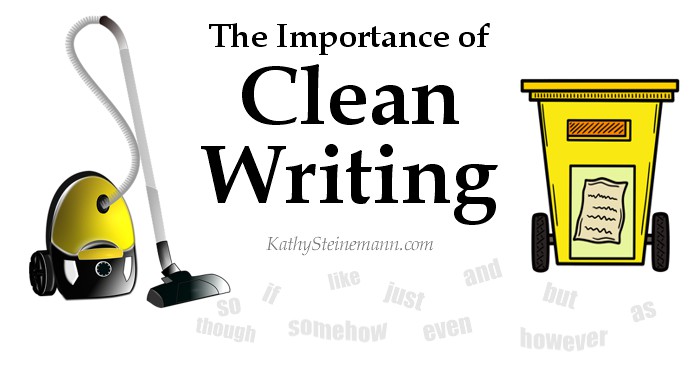
“Clean Text” in This Post Doesn’t Refer to Family-Friendly Content
If your writing trips people, even for a microsecond, it can result in confusion and lost readers. This guest post by Nmesoma Okechukwu describes the significance of clean writing.
—
The Importance of Writing Clean Text
I’ve always compared writing to painting. It’s not about having an elegant story to tell or finding that beautiful picture to paint: you have to find the right colors, or with text, the right words to tell it. Words should flow like a river, drawing your reader deeper and deeper into the literary work you’ve created.
Don’t Mentally Trip Your Readers
You know how words are arranged in a song to flow with the beat? The same applies to any literary work. The reader has to be in tune with the story you’re telling, and to do that, you should make absolutely sure not to trip them.
A great story might still turn us off even when there’s no conscious errors in it. I say “conscious errors” because when we read, our subconscious is doing its own work in the background. Consciously, you may find a story interesting, but your subconscious isn’t exactly onboard with the way the story is being told. Our subconscious cues can awaken our conscious senses when these errors are made way too often to ignore.
This is why writing clean texts is important. Clean text doesn’t mean error-free text; it means a body of work that reads well. I’m sure that if you’ve been a reader for any length of time, you’d agree there are texts that are more beautifully written than others. Subject matter doesn’t even have to be the most interesting — they just read well.
For example, I’ve read a political piece that I enjoyed because of the words the writer used to tell the story. Notice I didn’t say the facts he used to tell the story. When I studied the text again, I didn’t see any more interesting information than when compared with any other political text. It’s just the way he arranged the words, he arranged his buildup, and he made me a part of his story.
Because that’s what happens when your story reads well. It’s like the lolling of a boat ride on a gentle sea. It makes you feel comforted.
Be Careful of Overusing Certain Words or Phrases
Example Sentence #1:
One of the ways we can avoid mentally tripping our readers is by not overusing certain words in our write-ups.
Example Sentence #2:
One of the ways we can avoid mentally tripping our readers is by avoiding the overuse of certain words in our write-ups.
Both of the preceding are correct sentences, but the second one reads better even though we used one word in two different ways. This is not what I’m advising you to avoid.
I can tell you for sure that it didn’t take me five manuscripts during my earlier days as an editor to notice that authors naturally have a predilection for certain words. This is something we do. This is something I still do if I’m not conscious of it.
A Personal Experience
I remember reading one beautiful novel with a fantastic storyline, but halfway in, my brows were furrowed, and my brain had stopped enjoying it. The story was still interesting. It was the number of thoughs on every page that kept mentally kicking me. But this isn’t a one-off thing that affects just inexperienced authors. In my years of being an editor, I’ve seen this in beginner writers as well as those who have been published a few times before. For some, the battle is so, like, if, somehow, just, even, however, and even and. The preceding words by no means cover it, as there are many words we’re naturally attracted to, and we overuse them.
When this happens in any text, your readers are going to notice, even if your own mind has so conditioned you to the words that they don’t stand out for you. The trick is to identify the words — or ask a friend to help you if you don’t trust your self-judging abilities — and be conscious about how and when you use them.
Important
For some of you, who can afford line editors, developmental editors, proofreaders — the whole works — you might not understand the importance of being mentally conscious of what words you overuse and how you use them, but the important thing is that it eventually puts you on the path to becoming a better writer.
A good story is not a good story if it’s not well-written. It’s not about coming up with the most mind-blowing ideas, if the text cannot successfully translate it in a creatively beautiful way. When you write, each sentence should smoothly blend with the one before it and with the one after it. None of them should make your reader experience any kind of turbulence.
To Summarize
A good writer puts words together in a way that’s good, even as those words tell fantastic stories.
© Nmesoma Okechukwu
—
Biography

Nmesoma Okechukwu is an entertainment and music journalist, lifestyle blogger, editor, and author of the science fiction series, Cybernetics Within Us. Whenever she’s not writing and/or reading, which is rare, she’s traveling, goofing off with friends and family, and generally obsessing over animated characters — hello Yang Jian!
She is a passionate advocate for environmental preservation, and she has lent her voice to campaigning for the eradication of extreme poverty. She’s a writer and editor for MLRP Media Group, and her work has appeared in other publications like Tom’s Guide and Euphoria Magazine.
The Writer’s Lexicon series
and additional resources on my Facebook page.
Discover more from KathySteinemann.com: Free Resources for Writers
Subscribe to get the latest posts sent to your email.

I love reading historical books, but on occasion. names and places can hinder my reading flow.
Agreed. Smart writers don’t include a glut of unnecessary information. It’s a fine line between necessary and too much.
Thanks for stopping by, Kent.
I absolutely agree even when the words used are ordinary and you don’t need a dictionary to find the meaning.
Oh, yes, Leo. Especially the phrasing that adds to word count but not to the story. Aggravating.
Thanks for stopping by. Nmesoma Okechukwu is dealing with an emergency, so she might take a while to get back to everyone.
I wholeheartedly agree with the sentiments of this post. What irks me most is the number of professionally edited books that still contain “unclean” text.
Agreed, Thomas. And not all editors are good editors.
I see this happen all the time. I just wish writers would know that great ideas alone don’t make a good story. And thanks for your comment, I really appreciate it.
Repeated words and phrases are all too common in my writing because my brain is damaged, and takes the easy way out: use the words you already brought to the forefront of the mind, and it doesn’t have to work so hard.
Which is why the part of AutoCrit* I use the most is the software that detects these repeats – once they are pointed out, AFTER the writing happens, it is easy to ask myself where I have to use ‘that’ or ‘which’, and whether I really meant to use ‘but’ so many times in a single scene.
But I don’t let their existence get in the way of getting the ideas down, and the heart of the dialogue, and the plot development: it is part of a rigorous self-editing phase that on my better days I don’t have to use quite as many times on a scene as I do on most normal days (on bad days I can’t write at all).
I’d be embarrassed to have those first choices go out under my name on the cover, but it is much easier for software to count it up and point out where they are, than for a human to proofread a scene thirty times.
—
* I bought a lifetime subscription to AC MANY years ago, and never use any of their ‘AI’ suggestions – that part’s MY job.
Thanks for the info, Aicia.
I’ve heard positive comments about AutoCrit from other writers too. For me, it’s Hermetic Word Frequency Counter. It’s simple and gets the job done — without AI. I prefer Autonomous Imagination to Artificial Intelligence.
Thanks for sharing your experience. There’s nothing I love more than learning from the experiences of other writers.
Microsoft Word does that for me, though, I just type in a word I know I’m prone to ridiculously overusing and I see the number of times I use it. There’s also the great debate about the use of “suddenly” in manuscripts, and while I don’t totally agree with the sentiment, I make absolutely sure it’s needed wherever I use it. If not, I pull it.
Well said. I know I overuse some words. I used a word cloud program and discovered I use ‘looked’ far more than I should. I’m now going through my WIP checking (not looking ) for examples and changing most of them.
Definitesolutely, Vivienne. Our word habits are subconscious and often difficult to overcome.
Being conscious of it is the first step. I hate having to tell a writer they overused a word in their manuscript, and having the writer make it out that I’m the one who doesn’t know what I’m saying. When I read a work where the writer is making this mistake, I usually send it back and ask them to flush most of it out themselves.